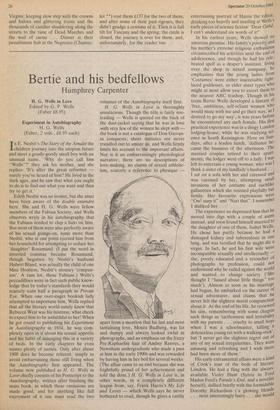Bertie and his bedfellows
Humphrey Carpenter
H. G. Wells in Love Edited by G. P. Wells (Faber £8.95)
Experiment in Autobiography H. G. Wells (Faber, 2 vols., £8.95 each)
In E. Nesbit's The Story of the Amulet the children journey into the utopian future and meet a goody-goody small boy with an unusual name. 'Why do you call him "Wells"?' they ask his mother, and she replies: It's after the great reformer surely you've heard of him? He lived in the dark ages, and he saw that what you ought to do is to find out what you want and then try to get it.'
Edith Nesbit was no ironist, but she must have been aware of the double entendre here. She and H. G. Wells were fellow members of the Fabian Society, and Wells observes wryly in his autobiography that the Fabians tended to clap a halo on him. But most of them were also perfectly aware of his sexual goings-on, none more than Nesbit, who at one point ejected him from her household for attempting to seduce her `daughter' Rosamund. (I put the word in inverted commas because Rosamund, though begotten by Nesbit's husband Hubert Bland, was actually the child of one Miss Hoatson, Nesbit's mousey 'compan- ion'. A rum lot, those Fabians.) Wells's peccadilloes were in fact such public know- ledge that by today's standards they would scarcely earn half a paragraph in Private Eye. When one over-eager bookish lady attempted to importune him, Wells replied that all the literary world surely knew that Rebecca West was his mistress; what cheek to expect him to be unfaithful to her! When he got round to publishing his Experiment in Autobiography in 1934, he was com- pletely open in it about his sexual appetite and his habit of assuaging this in a variety of beds. In the early chapters he even names plenty of names. Only after about 1900 does he become reticent, simply to avoid embarrassing those still living when the Autobiography first appeared. The volume now published as H. G. Wells in Love chiefly consists of his Postscript to the Autobiography, written after finishing the main book, in which these omissions are made good; and for anything like full enjoyment of it one must read the two volumes of the Autobiography itself first.
H. G. Wells in Love is thoroughly unsalacious. Though the title is fairly mis- leading -- Wells is quoted on the back of the dust-jacket saying that he was in love with very few of the women he slept with the book is not a catalogue of Don Giovan- ni conquests; sheer statistics are never trundled out to amaze us, and Wells firmly limits his account to the important affairs. Nor is it an embarrassingly physiological narrative; there are no descriptions of love-making, no claims of sexual athletic- ism, scarcely a reference to physique — apart from a mention that his last and most tantalising love, Moura Budberg, was fat and dumpy and always looked awful in photographs, and an emphasis on the frizzy Pre-Raphaelite hair of Amber Reeves, a Newnham undergraduate who made a pass at him in the early 1900s and was rewarded by having him in her bed for several weeks. (The affair came to an end because she was frightfully proud of her achievement and told the dons.) H. G. Wells in Love is, in other words, in a completely different league from, say, Frank Harris's My Life and Loves — which Wells says he never bothered to read, though he gives a cattily entertaining portrait of Harris the editor, drinking too heavily and snarling at Wells's early pieces of science fiction: 'Dear Gand, I can't understand six words of it!'
In his earliest years, Wells showed no amorous promise. His family's poverty and his mother's extreme religious enthusiasm circumscribed his activities until the end of adolescence, and though he had his cele-, brated spell as a draper's assistant, living over the shop in mixed company, he emphasises that the young ladies from `Costumes' were either inaccessible tight- laced goddesses, or elder sister types who might at most allow you to escort them to the nearest ABC teashop. Though in his teens Bertie Wells developed a fantasy of `free, ambitious, self-reliant women who would mate with me and go their way, as I desired to go my way', it was years before he encountered any such female. His first practical experience was in a dingy London lodging-house, while he was studying sci- ence in South Kensington. Here on Sun- days, after a leaden lunch, 'dalliance be- came the business of the afternoon. The married couples retired to their apart- ments; the lodger went off to a lady. I was left to entertain a young woman, who was I think a sister of my landlady's husband . • • I sat on a sofa with her and caressed and was caressed by her, attempting small invasions of her costume and suchlike gallantries which she resisted playfully but firmly. Her favourite expressions were "Ow! starp it" and "Nart that". I remember I disliked her . .
The experience so depressed him that he moved into digs with a couple of aunts instead, and soon found himself married to the daughter of one of them, Isabel Wells. He chose her partly because he had a damaged kidney and tuberculosis in one lung, and was terrified that he might die a virgin. In fact, he and his first wife were incompatible sexually and intellectually --- she, poorly educated and a retoucher of photographs by profession, could not understand why he railed against the world and wanted to change society (`She thought I "fussed about little things" too much'). Almost as soon as his marriage had begun, he embarked on the career of sexual adventurer, and claims that he never felt the slightest moral compunction about it. At the end of his life, he reviewed his sins, remembering with some chagrin such things as 'tactlessness and irritability with my parents . . . cruelty to small boys when I was a schoolmaster, killing a defenceless young rat with a walking-stick', but 'I never get the slightest regret out of any of my sexual irregularities. They were amusing and refreshing and I wish there had been more of them.' His early extramarital affairs were a kind of Cook's tour of the beds of literary London. He had a fling with the always- available Violet Hunt (Sylvia in Ford Madox Ford's Parade's End, and a novelist herself), dallied briefly with the formidable Dorothy Richardson Ca glowing blonde . . . most interestingly hairy . . . she would
lecture me on philology and the lingering vestiges of my Cockney accent while there was not a stitch between us'), and then got
caught up by the author of Elizabeth and her German Garden, whom he addressed
as 'Little e', and whose copulations with him were so energetic that together they twice broke a hotel bed. Thereafter, it was More often fans than fellow authors who supplied his sexual needs. When he be- came known in print as the advocate of free love (thereby rousing the wrath of St
Loe Strachey in the Spectator), young 'omen arrived in droves. One of these was in the habit of turning up at his flat in a raincoat and nothing else. Amber Reeves, who came into this category, addressed him as 'Master'. Even Rebecca West appeared on the scene initially as a disciple, and (according to Wells) made the first advances. However, he allows himself a moment of self-reproach over the con- ception of their son Anthony — whose own account of all this appeared in print a few months ago. An early illegitimate child had been begotten quite deliberately; Amber Reeves, though obliged to marry a gentle- man named Blanco White, had demanded that Wells provide her with a baby; he made no attempt to question this sudden Philo-progenitiveness in her, and we set about the business there and then'. The conceiving of Anthony West was a diffe- rent matter: 'It was entirely unpremedi- tated. Nothing of the sort was in our intention. [Rebecca] wanted to write. It should not have happened, and since I was the experienced person, the blame is whol- ly mine.' Rebecca became resentful of the continuing presence of Wells's second wife, Jane, but she got her own back in The Return of the Soldier, where the husband rejects the wife in favour of the mistress.
Jane Wells is the mystery element in H. G. Wells in Love. They met when he was teaching her biology for a B.Sc. in the 1890s, and he ran away from his first wife to live with her and (when the landlady made pointed remarks) marry her. She probably ought to have known what she was taking,on. But Wells maintains that from the beginning their companionship was intellectual rather than sexual, and accord- ing him she accepted the latchkey principle in the marriage without grum- bles. In their later years together they were apart for much of the year, Jane wintering in the Alps with their sons while Bertie dallied in Provence with his current mis- tress, the histrionic Odette Keun. Odette was an ex-nun and libellous novelist who (before they first met) dedicated a book to Wells, then summoned him to a darkened hotel room where she waited in a flimsy wrap, smelling of jasmine. She specialised In embarrassing Wells's more straitlaced 8uests; once at the dinner table, Sir Wil- fred Grenfell said he was vague as to what Casanova had actually done, so she told him in one word. It was during the Odette Keun period that Jane Wells died quietly of cancer, leaving no record of her feelings
about her husband's treatment. Wells wrote publicly and emotionally about her last days, and at the cremation took his sons into the furnace room to watch 'the whole coffin . . . pouring out white fire'. He thought it a beautiful sight.
At a few moments like this Wells has a touch of the ogre about him. But for most of the time, in these three volumes, he is charming, disarming company -- not so much a sexual adventurer as a victim, not only refraining from boasting of sexual prowess, but recurrently emphasising his lack of special intellect; the Experiment in Autobiography is subtitled 'Discoveries and Conclusions of a Very Ordinary Brain', which sounds like Winnie-the- Pooh. (A. A. Milne, as it happens, was taught maths by the young Wells.) And he got his come-uppance. In the 1930s, while working on The Shape of Things to Come (a title which must have caused raised eyebrows among those who knew about Wells's sex-life), he was ensnared by the Mata-Hari-like Moura Budberg, nicknamed `Bedbug' by the rejected Odette. But he had to share her with no less than Maxim Gorky, and her frequent vanishings to Russia left him in an agony of jealousy. Here at last was his self-reliant woman who would mate with him and go her way, and he didn't like it a bit. In the closing pages of H. G. Wells in Love he pines for, of all things, an ordinary faithful marriage.



















































 Previous page
Previous page